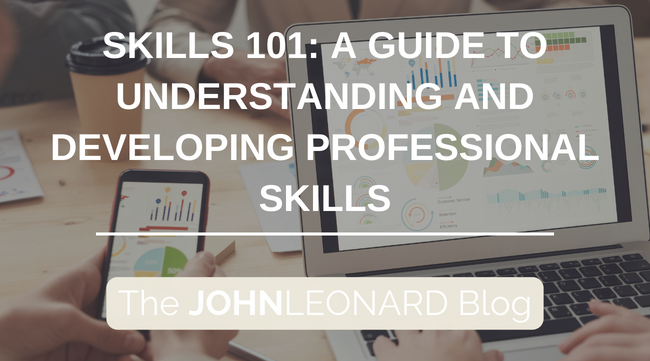Skills have been a popular workplace topic since 2022 and continue to be a trending topic in 2024. There are many different types of skills, and it can be challenging to figure out which are relevant for you as an employee or for your organization. This blog will help you understand these various skills with definitions, examples, and ways to develop your skill set.
What are skills?
Miriam Webster defines skill as “the ability to use one’s knowledge effectively and readily in execution or performance.” We start developing skills biologically at our youngest age and continue to acquire skills as we grow and progress in society. We learn new skills from experiences, education, work, play, and interaction with others. Some skills come naturally, and some we must work hard for long periods to develop. In the workplace, skills are necessary to do a job effectively and contribute to the success of a business.
Types of skills
Four categories of skills essential for the workplace are soft skills, hard skills, cognitive skills, and industrial skills.
1. Soft skills are behavioral and are developed from interpersonal activities and experiences throughout our lives. Think team sports, social interactions, and volunteering. These are important for working with others and contribute to fostering a collaborative and welcoming environment. Some common soft skills include:
- Leadership
- Listening
- Empathy
- Creativity
- Organization
2. Hard skills are technical skills acquired by practice and application and are important for performing a specific task(s) within a role or career. We typically gain these skills in school, through various courses, and on-the-job training. Here are some examples of common hard skills:
- Microsoft Office
- Sales
- Data analysis
- SQL
- Copywriting
3. Cognitive skills are fundamental brain processing skills that can be developed and exercised over time. How our brain processes information directly impacts how we focus, respond to, and complete tasks. Cognitive skills include:
- Problem-solving
- Critical thinking
- Communication
- Reasoning
- Collaboration
4. Industry skills are skills developed through working in specific sectors, otherwise known as industry knowledge. These skills are important for understanding the nuances of industry-specific environments and are applied with other hard and soft skills necessary for performing a job. Some examples include:
- Legal
- Investment
- Life sciences
- Defense
- Civil Engineering
Skills development: upskilling vs. reskilling
Skills development is significant in the workplace today. For employees, adding and improving your skills toolbox is paramount for career growth and success. For employers, developing employees’ skills impacts retention, satisfaction, and engagement and is critical for keeping business operations efficient and relevant. Researchers found that 92% of employees report they are more engaged in their role when provided workplace training, and companies that offered training to their employees found their profits increased by 21%. Before jumping into skills development, determine whether you need to upskill or reskill.
- Upskilling is the development of skills used in your everyday role. If you’re looking to continue on the path you’re already on, upskilling is the best choice for your career trajectory.
- Reskilling is acquiring new skills outside of what you currently use daily, which is excellent for expanding your current role or pivoting into something different.
Ways to develop your skillset
Thanks to the advancement of technology, opportunities for learning and development are incredibly accessible. Most companies offer their employees some degree of professional development or educational benefits. Taking advantage of development programs provided by your employer is a no-brainer! If those benefits aren’t available to you or you would like to take things into your own hands, consider these avenues:
- Take LinkedIn Learning courses
- Register for local or virtual workshops
- Explore programs at a local community college or high school
- Attend webinars
- Join professional associations
- Volunteer
- Find or be a mentor
- Take advantage of JOHNLEONARD’s FREE Microsoft Office tutorials and assessments
So, now that you have a better understanding of the skills landscape, how should you begin? Start by auditing your existing skill set and analyzing your career aspirations. From there, you can decide which skills need growth and what needs to be added to your toolbox. Whether you want to upskill or reskill, prioritizing skill development is the key to unlocking your career potential and increasing your value in the workplace.
Looking for more ways you can succeed in your job search? Subscribe to The JOHNLEONARD Blog!


